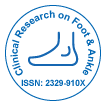Orthopaedic Device Related Infections (ODRI) - Diagnosis, Treatment and Prevention
Editor assigned: 01-Jan-1970 / Reviewed: 01-Jan-1970 / Revised: 01-Jan-1970 /
Editorial
Orthopaedic device-related infection (ODRI) is a major complication in trauma and orthopaedic surgery, resulting in high patient morbidity and health care costs, as well as presenting diagnostic and therapeutic challenges. Due to an increasing elderly population, the demands for orthopaedic devices and their associated infections are expected to increase. Some microorganisms that cause ODRI have the ability grow as biofilms on the device or tissues. Biofilms are difficult to diagnose and treat since they commonly show increased resistance to antibiotics. Together with the global rise in antibiotic resistance, there is a need for a research focus on the development of novel strategies for the infection control of ODRI. Ultimately, the best strategy is the prevention, since every time a patient experiences an infection relapse, it often results in a worse functional outcome.
Advanced diagnostic methods for ODRI include the use of implant sonication, molecular methods and biofilm susceptibility testing, among others. A prompt and clear diagnosis is a critical first step to guide the surgical and antimicrobial treatment decisions.
In parallel, clinical and microbiological guidelines have been established for the management of ODRI and biofilm infections in general. However, optimized patient-tailored treatment practices will most likely have a positive clinical impact.
Despite the current infection control measures pre- and post-surgery, to further decrease the incidence of ODRI, research efforts need to be directed towards the development of new antimicrobial orthopaedic materials and alternative compounds to antibiotics. Recent advances are arising in this regard, where materials are being developed to either inhibit bacterial adhesion or biofilm formation on the implant or to release bactericidal compounds that kill bacteria in the implant surroundings. Some of these strategies are showing promising results in vitro and in vivo, however, only a few are evaluated in translational studies with patients.
This research topic will focus on ODRI from an interdisciplinary perspective, including basic science innovations and best practice in orthopaedics and infectious diseases, aspects on the pathogenesis, diagnosis, therapy and strategies for the infection control of ODRI. It will include: studies with focus on the clinical management of ODRI (including surgical methods and treatment algorithms); microbiological profile of ODRI; phenotypic and molecular characterization of microorganisms causing ODRI; impact of antibiotic resistance on treatment outcomes, as well as translational studies, in vivo and in vitro experimental models for the assessment of novel strategies aimed at preventing or treating ODRI (including systemic and local delivery strategies, antimicrobial coatings, antimicrobial peptides, quorum-sensing inhibitors, biofilm-degrading enzymes, bacteriophages and vaccines).
All contributions to this Research Topic must be within the scope of the section and journal to which they are submitted, as defined in their mission statements. OMICS reserves the right to guide an out-of-scope manuscript to a more suitable section or journal at any stage of peer review.
Share This Article
Recommended Journals
Open Access Journals
Article Usage
- Total views: 1892
- [From(publication date): 0-2021 - Apr 07, 2025]
- Breakdown by view type
- HTML page views: 1129
- PDF downloads: 763
